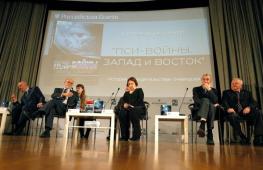Fables little monkey and glasses.
The fable “The Monkey and Glasses” by Krylov will tell about the stupid Monkey, who broke good glasses because of his own ignorance.
Read the text of the fable:
The monkey has become weak in his eyes in old age;
And she heard people
That this evil is not yet so big of a hand:
You just need to get glasses.
She got half a dozen glasses for herself;
Twirls his glasses this way and that:
Now he will press them to the crown, then he will string them on the tail,
Now he sniffs them, then he licks them;
The glasses don't work at all.
“Pah the abyss!” she says, “and that fool
Who listens to all human lies:
Everything about Points was just lied to me;
And there is no use for a hair in them.
The monkey is here with annoyance and sadness
O stone so sufficed them,
That only the spray sparkled.
Unfortunately, the same thing happens to people:
No matter how useful a thing is, without knowing the price,
The ignoramus about her tends to get worse all the time;
And if the ignorant is more knowledgeable,
So he still chases her.
Moral of the fable Monkey and glasses:
The moral of the fable is that often the ignorant, not bothering to inquire about the value of any object, begin to speak badly about it. This happens in real life too. For example, people who do not appreciate scientific and technological progress tend to speak negatively about the achievements of mankind, forgetting that it is thanks to science that a person is spared exhausting physical labor, numerous diseases, etc. If a person does not know how to use any thing is not a reason to speak badly about it, the fabulist teaches.
Monkey and glasses - Krylov's fable, ridiculing the ignorant. Written in 1812, but does not lose its sharpness and craftiness to this day.
Fable Monkey and glasses to read
The monkey has become weak in his eyes in old age;
And she heard people
That this evil is not yet so big of a hand:
You just need to get glasses.
She got half a dozen glasses for herself;
Twirls his glasses this way and that:
Now he will press them to the crown, then he will string them on the tail,
Now he sniffs them, then he licks them;
The glasses don't work at all.
“Pah the abyss!” she says, “and that fool
Who listens to all human lies:
Everything about Points was just lied to me;
And there is no use for a hair in them.
The monkey is here with annoyance and sadness
O stone so sufficed them,
That only the spray sparkled.
And if the ignorant is more knowledgeable,
So he still chases her.
Moral of the fable Monkey and glasses
Unfortunately, the same thing happens to people:
No matter how useful a thing is, without knowing the price,
The ignoramus about her tends to get worse all the time;
And if the ignorant is more knowledgeable,
So he still chases her.
Fable Monkey and glasses - analysis
Krylov's fable The Monkey and Glasses is remarkable primarily because the main idea in it is expressed not only in morality, the main irony is in the text. An attentive reader will easily understand that the Monkey plays the role of an ignoramus, and glasses are directly associated with science. People-Monkeys, who do not understand anything in science, far-sighted and vigilant, like glasses, often with their ignorance will only make everyone around laugh. Ignorance, especially high-ranking officials, affects everyone around. The irony is that they cannot hide their simplicity and narrow-mindedness.
The fable “The Monkey and Glasses” was written by Krylov in 1814, but this does not at all reduce its significance and relevance for the modern generation, rather, on the contrary, because science does not stand still, and unfortunately not everyone strives to comprehend it. At the same time, only a few admit their ignorance, the rest turn into the same Monkeys, as in this fable. We invite you to read it now.
Fable "Monkey and Glasses"
The monkey has become weak in his eyes in old age;
And she heard people
That this evil is not yet so big of a hand:
You just need to get glasses.
She got half a dozen glasses for herself;
Twirls his glasses this way and that:
Now he will press them to the crown, then he will string them on the tail,
Now he sniffs them, then he licks them;
The glasses don't work at all.
"Ugh abyss! - she says, - and that fool,
Who listens to all human lies:
Everything about Points was just lied to me;
And there is no use for a hair in them.
The monkey is here with annoyance and sadness
O stone so sufficed them,
That only the spray sparkled.
Unfortunately, the same thing happens to people:
No matter how useful a thing is, without knowing the price,
The ignoramus about her tends to get worse all the time;
And if the ignorant is more knowledgeable,
So he still chases her.
The moral of Krylov's fable "The Monkey and Glasses"
The moral of the fable “The Monkey and Glasses” is not just traditionally written in the last lines of the work, but even structurally highlighted with an empty line, and it is deciphered as follows: if you don’t know how to use this or that thing or information, this does not mean that it is useless. And by ridiculing or forbidding it (when it comes to officials), the Monkey people themselves expose themselves to ridicule.
Analysis of the fable "Monkey and Glasses"
The plot of the fable "The Monkey and Glasses" is banal. The monkey - in Russian folklore a rather stupid animal, but very similar in perception of the world and actions with a person - heard from people that you can correct the problem of vision that has deteriorated with old age with the help of glasses. Not understanding what and why, she got more of them (half a dozen - 6 pieces) and, trying on glasses on different parts of the body (after all, how to use them correctly, the Monkey did not ask / did not listen to the end), she was very surprised why they did not help. At the end of the story, the animal, offended by people, calling them liars and not finding a use for an object unknown to it, breaks glasses on a stone.
A simple situation, but so illustrative, especially when you consider that the Monkey here personifies all the ignoramuses, and the glasses represent science. And everything would not be so sad if ignorant people met only among ordinary people, but there are enough examples in history when Monkey people occupied high-ranking positions and with their ignorance deprived the rest (albeit for a while, until the change of power), new knowledge and opportunities.
Winged expressions from the fable "Monkey and Glasses"
- “That fool who listens to all people’s lies” is used as a mockery in the fable “The Monkey and Glasses” over those who attach too much importance to the opinion / words of others.
- “The monkey has become weak with its eyes in old age” - one of the types of self-irony in relation to one's own myopia.
Monkey and glasses drawing
Fable monkey and glasses read text
The monkey has become weak in his eyes in old age;
And she heard people
That this evil is not yet so big of a hand:
You just need to get glasses.
She got half a dozen glasses for herself;
Twirls his glasses this way and that:
Now he will press them to the crown, then he will string them on the tail,
Now he sniffs them, then he licks them;
The glasses don't work at all.
“Pah the abyss!” she says, “and that fool
Who listens to all human lies:
Everything about Points was just lied to me;
And there is no use for a hair in them.
The monkey is here with annoyance and sadness
O stone so sufficed them,
That only the spray sparkled.
And if the ignorant is more knowledgeable,
So he still chases her.
Moral of Ivan Krylov's fable - Monkey and glasses
Unfortunately, the same thing happens to people:
No matter how useful a thing is, without knowing the price,
The ignoramus about her tends to get worse all the time;
And if the ignorant is more knowledgeable,
So he still chases her.
Morality in your own words, the main idea and meaning of Krylov's fable
Under the glasses, Krylov showed knowledge that very often breaks down on the unwillingness to learn, improve, break through, try. Hence the result: the silly monkey was left with nothing.
Analysis of the fable Monkey and glasses, the main characters of the fable
"The Monkey and the Glasses" is an easy, accurate work, and most importantly, it is a necessary guide to the right actions in life. Krylovsky's humor is striking (glasses are sniffed and licked by a monkey, put on the tail) and prudence in the form of morality at the end of the fable. Ivan Andreevich once again brought a person with a serious flaw onto the stage in order to help many others eradicate a similar flaw in themselves.
About the fable
"The Monkey and Glasses" is a fable for all time. In it, Krylov quickly, briefly and very accurately revealed the inner essence of a stupid, uneducated, infantile person. The 21st century is the century of new brilliant inventions that are impossible without the necessary knowledge, perseverance, the ability to think, analyze, compare. Reading and studying the fable "The Monkey and Glasses" at school is an initial guide to action - to study long and patiently, diligently and with pleasure, so that later, in adulthood, give people new ideas and promote them to life.
From under the thin pen of Krylov, a fable about a monkey and half a dozen glasses came out in 1812. It was the year of the war with the French. The allegorical nature of the fable helped the writer to talk about ignorant and empty people who scold science and knowledge and do not benefit the state. If at that time there were fewer such "monkeys", then the outcome of the war would have been different. The fabulist, laughing and ironically, raises in his fable the great human problem of stupidity and idleness.
Monkey is the main character
The main character of the fable is a monkey. She is fidgety, impatient, superficial. Hearing about the benefits of glasses, she immediately tried to correct her weakened vision with them. But how to do this - did not specify. They say about such "comrades": "tap-blunder" or "heard a ringing but does not know where he is." You can understand the monkey's haste - she rather wants to see the world with healthy eyes. But haste and ignorance have never benefited anyone, as well as ardor and anger. Was it worth it to smash all the glasses to smithereens, then to remain visually impaired and unsatisfied?
Popular expressions that went from the fable Monkey and glasses
- That fool who listens to all the people's lies
- Monkey old age became weak eyes
Listen to Ivan Krylov's Fable Monkey and Glasses
A fable is a short story, usually written in poetic form, with an ironic focus. This genre of literature has a peculiarity: although it usually tells about animals, birds, insects, it must be understood that this is an allegory, but in fact it is about what worries society. is just a prime example of this type of work. Another characteristic feature of the fable is the use of allegory. A certain animal actually symbolizes some traits that are more likely to be human. At the very end of the fable, there is a small conclusion - It is not surprising that skits based on them are often played out on the school stage. After all, fables are similar in structure to short plays, everything is presented very figuratively, and the voice-over comments on the actions of the characters.
Krylov's fable "Monkey and glasses". Content
In 1812, Krylov created the fable "The Monkey and Glasses". Since the name of the animal is written with a capital letter, we can assume that in fact it tells not about a monkey, but about a person. Krylov's fable "The Monkey and Glasses" tells the story of a monkey who, with age, has vision problems. She shared her trouble with others. Kind people said that glasses can help her see the world more clearly and better. Unfortunately, they forgot to explain exactly how to use them.

The monkey took out a few points, but did not manage to use them correctly. She tries to string them on the tail, presses them tightly to the crown of the head, tastes, smells. Of course, all these actions did not lead to the fact that she began to see better. Then the monkey comes to the conclusion that people lied to her, but in fact there is no use in them. Annoyed, the Monkey breaks his glasses so that the splashes from the glasses scatter in all directions.
Krylov. "Monkey and Glasses". Analysis
As is customary in fables, an instructive conclusion (moral) is contained at the very end of the work. Even when the proposed thing is very useful, not knowing what exactly, the ignoramus will come to the decision that there is no use in it. If a person who does not understand science occupies a high position, then he will be engaged in the persecution of those innovations that he has not been able to understand. Events like this have happened throughout history. Suffice it to recall the persecution of geneticists who were in the USSR.

Officials could not understand this science and categorically decided that it was false. This is just an example of how the ignorant more knowledgeable ended up on the throne. The fable "The Monkey and Glasses" tells about such people. Krylov in his works clearly ridicules human stupidity.
About vices and shortcomings
Like any work of this genre, this fable is very ironic. It immediately becomes clear that we are talking about ignoramuses who do not understand science. The work ridicules certain vices and shortcomings that a person has. Krylov's fable "The Monkey and Glasses" suggests that the author does not laugh at this particular monkey, but at all the ignoramuses who do not want to understand the obvious.



